#yes the rabbit part was a Monty Python reference
Explore tagged Tumblr posts
Text
The last post was a rhetorical question, but, glad you guys want to hear me out!
Anyway, the Imperial Palace is haunted. "Haunted".
Surely, there are no such things as ghosts, right?
Except, when the Raven Guard Astartes began to report things disappearing when you don't look at them and also seeing pale ghostly figure stalking the hallways, people began to tense up, even though some just brushed it off as them confusing a ghost for one of their own. When the Custodes began to back up the Raven Guard's claims, the Primarchs got involved.
So, the main ghost hunting squad consists of Horus, Sanguinius, Corvus and Alpharius (and Omegon, but, shh). If we assign them the "Mystery Gang" roles, then Horus is Fred, Sanguinius is Daphne, Corvus is Velma and Alpharius is either Shaggy and Omegon is Scooby, or it's the other way around. No one notices the changes anyway.
A lot of their methods include things like a ouija board (from which they learned many interesting things about the ghost, particularly how many pickles it can shove up its ass), asking the ghost questions in the dark room, taunting the ghost (and screaming like little girls when the ghost retaliates), using a radio to try to communicate with it... That kind of stuff. A lot of the times, Corvus tries to negotiate with the ghost by offering Horus a sacrifice, much to Sanguinius' annoyance. Surprisingly, Horus doesn't really mind becoming a sacrifice (he thinks he can fight the ghost off) (he can't do shit). Alpharius and Omegon are both amused, however they initially didn't take the hauntings seriously. As time went on, though, they slowly started to plan their way out of the group.
The gang then turned to Lorgar for help. Their research led them to find out that numerous religions, in the past, had ways to ward off ghosts. Perhaps Lorgar can do something? Lorgar decided that a religious sacrifice could potentially pacify the paranormal ("No, Corvus, we are not sacrificing Horus"). He ordered Alpharius and Omegon to find and bring a small animal that they could sacrifice, while Lorgar prepared the salt, the candles and the prayers. Alpharius brought a little white rabbit from the Palace's kitchen. Sanguinius was sad to see such cutie get sacrificed, he made sure to give that rabbit some pats before the ritual. When the right time came, the Primarchs, all 6 of them now, stood in the circle made out of salt, in the room that was pitch black safe for some lit candles. Lorgar read the prayers and tried to stab the rabbit in order to kill it. The dagger, instead, bent to the side, as if the animal was made out of steel. The white rabbit then became possessed and jumped onto Alpharius, trying to bite through his helmet... And almost succeeding, had Sanguinius not grabbed and tossed the vermin out from the circle. Despite being tossed by a Primarch with full force, the rabbit didn't even break a sweat, instead preparing to pounce on its next victim. Thankfully it was put down by Horus and a couple of shots from his bolter pistol that he thankfully brought with himself. The killer rabbit was dead and Lorgar felt despair. Why didn't his faith in their father stop the malicious presence? He will make that ghost pay! Feeling wronged, he joins the ghost hunting squad and helps keep the group together and to coordinate the rituals.
Magnus thinks he can crack the case himself. He gets the photo evidence of paranormal activity, however, his recording skills are subpar. The photos and videos are blurry as fuck, as if Magnus covered the lense with a thick coat of vaseline beforehand. No one believes him or takes his evidence as, well, actual evidence... Except Jaghatai. His bike has been acting weird lately. Sometimes it turns on all by itself, drives itself for a good distance, sometimes it refuses to turn on, or strange things pop out on the display. Something is messing with his bike and the Great Khan is REALLY pissed at this. And, so far, he only trusts Magnus with this, so, they become a ghost hunting duo. Through the series of unfortunate events, the two have to race away from the pissed off ghost, with Magnus clinging onto Jagh and yelling "DRIVE FASTER, I'M SCARED".
The ghost also visited the Night Haunter himself. When Konrad realized he had an intruder he looked at the ghost, who decided to appear to him as a demonic looking old woman, taller than Konrad himself. Their eyes locked together and Konrad just... smiled, his rotting teeth revealed by a wide grin. He and the Night Lords were never bothered by the ghost again after that.
When news reached Roboute of what was happening in the Imperial Palace, he just made a shocked face and went "Oh no... Anyway!" and then went back to drinking the finest of wines you could find on Ultramar, while basking under Macragge's sun. Jackass.
Ferrus and Rogal were both working on the project together and didn't even notice the ghost. At some point, the ghost became a third participant: holding a hammer or shinning a light where it was needed. When Ferrus and Rogal realized what was happening, they just... Went back to work and continued to exploit the ghost. They would never say no to free labour.
#warhammer 40k#primarchs#sanguinius#horus lupercal#konrad curze#corvus corax#alpharius omegon#alpharius#omegon#lorgar aurelian#magnus the red#jaghatai khan#roboute guilliman#ferrus manus#rogal dorn#yes the rabbit part was a Monty Python reference
123 notes
·
View notes
Text
As I have been reblogging and looking back at Sleeping Beauty stuff around the Internet, I realized the thing that is bothering me a bit... When it comes to the you know "original" format of Sleeping Beauty.
Everywhere on the Internet you have these posts and videos and whatnot about "The dark truth behind Sleeping Beauty" or "The Horrifying Origins of Sleeping Beauty!", and they all refer to the fact that in the "original" version of the tale, she got raped in her sleep. This is the "dark fact" everybody LOVES to spread around and talk about. Except... Except the version they refer to is Basile's "Sun, Moon and Thalia".
Why does that matter? I'll explain.
Everybody depicts "Sun, Moon and Thalia" as this sort of dark, horrifying tale of a grim and gruesome crime. They will have in their video a dark background, and creepy illustrations, and they will take an ominous horror movie voice and whatnot.
But there's a big problem with that. Basile's stories were all except serious. They were humoristic tales. Or more precisely, they were farcical stories. Farces. There's a reason its "twin compilation", Straparola's fairytale collection, is called "Facetious Nights". So the very idea of presenting these stories as if they were meant to be taken seriously is completely misreading the story's tone. Yes there was a rape - but if you extract this from the entire context and storytelling, you make this tale sound like something it is absolutely not.
"Sun, Moon and Thalia" is not meant to be a horror story. It was not meant to be read as "serious" story. It has nothing to do with either the Grimm or Perrault fairytales. The entirety of the "Pentamerone" is basically a folk-sex comedy. If such a thing can exist.
Every fairytale of the Pentamerone is opened by a small recap of the story announcing what it will be about - and already from the get-go the very two lines opening this recap give the humoristic nature of the tale away. "Thalia dies because of a splinter". I mean come on - the joke is obvious. A girl gets a splinter, she dies. And if this wasn't enough the rest of the sentence can be translated as following: "she is left in a room where the son of the king penetrates and makes her two children". The choice of the word "penetrate" is to highlight the pun in the original line where the prince entering Thalia's bedroom and the prince entering Thalia's body is resumed in one same verb.
For more breakdown of the jokes of the story, see below the cut:
As I said before from the get-go the "curse" is treated as a joke. You have this king that summons scholars to make his daughter's horoscope, right? And what does it say. "She is in great danger... BECAUSE OF A SPLINTER!". This is literaly the killer rabbit of the Monty Pythons.
In this story, what does the little old woman that offered the princess the spindle does, once the princess falls dead? (Because she is dead in this version, a magical death, but dead still). Does she warns everybody and cries for help as in Perrault's version? No! "She was quick to find back the stairs [from which she came in]" and she runs as fast away as she can without warning everybody, because she's not going to get into trouble because of some random girl that wanted to see how to spin.
The whole arrival of the prince is very, VERY unprincely and part of the joke. (Well it is a king here but I'm going to call him "prince" so as to not lose people). So he is hunting, right, and his hunting falcon enters the countryside building in which the king locked up his daughter's corpse. The prince wants to get back his bird, so he knocks - because he believes the house is inhabited. And since nobody answers and he REALLY wants his bird back, he fetches a ladder and is forced to climb up a window like a vulgar thief. And he is royalty, remember.
What is the prince's first interaction with the dead Thalia? Believing she is asleep, he starts talking to her. And since she doesn't answer he kind of shakes her around in trying to wake her up. And then suddenly, realizing she kind of looks good (an that she is visibly not alive anymore), he "does his little business" and promptly puts her back where he found her and leaves. Because he is, like most men in the Pentamerone a stupid horny dog without much morals that has the most sudden and bizarre bursts of sexual desire. Cause again the Pentamerone is a sex comedy.
In fact, in the story of "Sun, Moon and Thalia", the prince is MEANT to come off as quite stupid. He is stupid. First off he didn't get that Thalia was dead when he saw her. Then, as soon as he leaves the funeral-house, it is said he "forgot all about this adventure". Like literaly, he forgets all about it - and only suddenly remembers it randomly when Thalia wakes up. (The narration itself highlights the randomness of the events - the fact the prince remembers Thalia is random and for no reason, and in the same way there are two fairies that randomly appear out of nowhere to take care of the two babies and we are never explained anything about them - they even frighten poor awakened Thalia because she doesn't know who brings her magically food every day). When he sees back Thalia, he is all joyful and happy and he is like "Let's start a family! I'm a dad, woohoo!" ; and then the narration drops the bomb that nothing had foreshadowed: "Now, his wife was waiting for him back at the palace." The randomness of dropping the fact he has a wife is meant to be the joke, since we were led to believe he was a bachelor. But given the prince's tendency to forgetfulness it is very likely that he simply forgot he had a wife.
More of the prince's obvious stupidity and air-headedness. On one side how he betrays Thalia and her children's names to his wife - because he just can't stop repeating and singing their names out loud, day and night, even when eating or sleeping, due to how silly-happy he is. On the other, the reason why he is absent while his wife tortures Thalia: he got angry at a comment of hers, and because he was furious, he literaly had to go to ANOTHER LAND just to vent his anger. Literaly, he leaves his palace and moves to another of his domain just because he got pissy. And why did he get pissy? Because his wife kept ironically singing to him "Eat, because what you eat belongs to you" when she served him his "children" - and the stupid prince, unable to understand what she meant, literaly answers "Of course it belongs to me: I'm the bread-winner of the family, while you're doing nothing and bringing nothing to the house". [Which by the way, highlights the fact that in this couple, the wife is depicted as profiting off the king's wealth and power].
Speaking of the dinner around the fake "children": this meal is another sex joke. Because the two of them, the wife and husband, are "panting with desire" around the dishes, and keep singing stuff like "Oh that's good, oh that's good!" and "Come on, eat, come on eat!" making it all an erotic scene. A ridiculous, grotesque, perverse erotic scene around what one character believes to be a cannibalistic meal, while the other just very loudly appreciates good meat.
When the queen tries to have Thalia killed, Thalia tries to defend herself by the fact she didn't know of the queen's existence, and that any sexual thing that happened between her and the prince was in her sleep - which the queen of course does not believe because of how ridiculous it all seems. I mean you catch who you believe is your husband's lasting extra-marital mistress and what is her excuse? "Oh no you see, he made me my kids when I was asleep. Well kind of dead. I didn't know. No he did not wake me up. I didn't wake up either when the kids were born. I'm a really deep sleeper. And it was because of a splinter you see..." Literaly, imagine yourself in the place of the jealous queen hearing all that.
Thalia gains time on her execution by asking the permission to remove her clothes, and the queen accepts, but as a joke she accepts out of greed because she literaly wants to take back Thalia's dress and jewels for herself. And each time Thalia removes a piece of her clothes, she screams. She screams in hope of alerting the prince. But since the prince is far away, he doesn't hear until the very last scream. Meaning that Thalia literaly strips herself in front of the queen, while screaming every time she takes off a piece of clothing, to visibly no effect (which must leave the poor queen quite confused), and it is only when Thalia gets naked and pushes the final scream that the prince suddenly arrive. You can imagine Thalia going: "FINALLY! I've been screaming for hours now!" (especially when you consider how much pieces of clothing princesses wore at the time).
Literaly one of the threats the prince gives to his wife is "Get ready to go fatten up the broccolli". As a metaphor for being dead and buried underground. Tip-top manly threat. In fact the prince is here quite proficient in ridiculous poetic metaphors: when the cook reveals he saved his children, the prince says "Get ready to move out of the small kitchen of my castle to the vast kitchen of my heart."
And of course the final "moral" of the story is also part of the entire farcical joke that is this story. "People who are lucky receive good fortune, even in their sleep". You literaly have a girl who is randomly raped in her sleep and gives birth to children in her dead-sleep, and then is almost murdered by the rapist' wife... And THAT'S the moral of the story? If you take it all literaly, then you are a fool. Or at least Basile would have called you a fool.
Again, people tend to forget that when it comes to literary fairytales (but also a lot of folk-fairytales) there is a TONE that is important. It is the brothers Grimm and other collectors after them that imposed the idea that fairytales were meant to be read "seriously". A lot, LOT of fairytales were originally humoristic - even going into dark humor or sex comedy. And whenever you go by Straparola or Basile, you HAVE to look at them under the angle of a joke or humor, and search for the puns and caricatures and ridiculousness within these tales. Because these books were meant to be read as such. They are like Rabelais' Gargantua or Shakespeare's comedies. You can of course reinterpret them as "serious" tales... But it won't remove the fact the original was humoristic.
#sleeping beauty#dark fairytale#thalia the sun and the moon#sun moon and thalia#thalia sun and moon#basile#pentamerone#italian fairytales#fairytale history#humoristic fairytale#sex jokes#sexuality in fairytales
27 notes
·
View notes
Note
What animal do you think suits each of the umbrella kids the most?
okay what you don’t know is that i’m a sucker for a his dark materials au with daemons so i’m sorry if that’s not what you want but that’s what you’re getting lmao
forewarning: this is super self indulgent and i only have actual reasons for like maybe half of these
Luther: a dog! If you want specifics probably an Anatolian Shepherd dog bc they’re big motherfuckers and muscular as fuck. I did toy with a big animal like a bear but ultimately I think a dog just because simply: Luther obeys Reginald without question and has incredibly loyalty to a man that never cared about his wellbeing. Plus, you know, the family would rib at him about being Reginald’s loyal dog and all that. Plus it’s a good set up for his rivalry with Diego that I’ll yell about in a minute.
So yes, Luther’s daemon settles as a bigass dog. She’s pragmatic and can be cold and often tries to model herself after Reginald’s daemon. She can be somewhat self righteous and very blunt. She tends to say exactly what she’s thinking without sugar coating it and doesn’t care if Luther has to stumble to save face. “You think one of us killed dad.” Diego says. “No not ‘one of you’, specifically you, Diego. You have an alibi?” Luther’s daemon says in front of the family, god, and Five’s portrait on the mantle.
Diego: a wolf! This sets up a big rivalry between Diego and Luther as they have somewhat similar daemons except for the fact that Luther’s is a domesticated canine and Diego’s is a wild one. Luther often uses Diego’s daemon to say that Diego is too wild to lead the team and that’s why he’s in charge. It’s mainly because while Diego does his whole lone wolf act, he’s shown to be pretty protective of the people he considers his and really he does need a pack. Even though he tells Klaus no, he doesn’t bother enforcing it when Klaus insists on hopping in the car anyway. He wants to be leader of the pack, but is awkward when he tries to be in charge bless his heart.
Diego’s wolf daemon is a not-so-secret softie. She prompts Diego to interact more with his family and sends longing glances towards Detective Patch and her daemon. She doesn’t get along with Luther’s daemon and always bristles when she’s around, though Luther’s daemon tends to ignore Diego’s and act like she’s above it all which just makes the issue even worse tbh. Diego’s daemon doesn’t shy away from her instincts and refers to the family as her pack and is very vocal about both not killing Grace (though later she sits and whines when Diego does it) and letting Vanya out (Diego spits vitriol about Vanya but his daemon is suspiciously silent on the subject).
Allison: a burmese python! I will freely admit that i chose this 90% because of the feather boa in the beginning dance scene because I want Allison to have her daemon constantly draped around her neck and on her body, but snakes do tend to be associated with manipulation as well in some stories even though I can’t see it looking at their cute little faces?? But I mean Allison’s whole gig is manipulation so it fits even though I’m only justifying it after the fact lmao.
Allison’s daemon is very laid back and rarely speaks up. Allison often accuses him of being lazy because she tends to carry him everywhere and he’s constantly on the hunt for warm places to curl up in. He used to ride on the back of Luther’s daemon a lot when Allison got fed up of carrying him. Uses the fact that he doesn’t have eyelids to stare people down when they’re being irritating. Generally does not appreciate the negative press that comes with being a snake daemon and secretly him and Allison both wonder if him being a snake was a factor in her not getting custody of Claire. (Allison didn’t appreciate what he settled as and they fought about it, there’s still some tension between them on occasion because of it)
Klaus: a black cat! I almost gave him a raven because reasons but I ended up with a cat for pretty simple reasons: Klaus is pretty much a stray cat in human form tbh just look at him. Also because cats stare off into corners like they can see the dead and damned so I thought it was somewhat appropriate, and black cats are considered both lucky and unlucky depending on where you like (which lemme tell you as a black cat owner who moved from a lucky to unlucky area was a wild thing to find out).
Klaus’s daemon is very sarcastic and a lot less forgiving than Klaus himself is. They hold a grudge to say the least. While most daemons tend not to speak to people who aren’t their own, Klaus’s daemon doesn’t give a single shit and will talk to anyone they damn well please. Doesn’t get along with Luther’s daemon because they constantly talk shit about Reggie and Reggie’s daemon, but gets along very well with Diego’s daemon and has ridden on her shoulder more than once. Shares Klaus’s power in that they can see the dead but ignores them even harder than Klaus because they’re secretly freaked out that ghosts don’t have daemons. Klaus and his daemon also hang out with Ben’s daemon, who for reasons unknown didn’t burst into dust upon Ben’s death but she generally stays out of sight.
Five: one part of me says hare because of the cryptic value and eyes that look like they could kill you and also jumping jokes and another part of me says hummingbird for plenty of good reasons but an even larger part of me says that I don’t have to choose because I can just symbolically make his daemon unsettled. She wasn’t settled before the apocalypse and then he kind of… never really grew up. Part of a daemon settling is growing up and knowing yourself but Five didn’t have a chance to do that, he was too focused on his goal. They both dislike the fact that she’s unsettled because they think it’s childish, but it’s also very handy because it means she’s adaptable as fuck. Maybe she pretends she’s settled as a hare or something while they work for the Commission idk and it’s a little reveal when he’s back home. Maybe they’re also separated like a witch’s daemon due to the Commission?? unclear
Five’s daemon tends to fade into the background if you’ll let her. She tends to be standoffish but is exceptionally observant. She very rarely speaks to anyone outside of Five, even among the siblings, though she’s not above bluntly calling them out if Five isn’t around and she deems it necessary. She likes Vanya best, though she was also fond of Ben. She tends to be the voice of reason for Five and probably takes most of Dolores’s lines in telling him drinking is bad for him or that his equations are wrong. There’s probably a dramatic scene where she’s revealed to be unsettled where she turns into a big fuckoff animal and fucks up the Handler or something idk but otherwise she’s pretty content to remain a hare and do a good impression of the rabbit from monty python if people fuck with her.
Ben: something smaller and easily hidden. My heart says rat because they’re so fucking good and smart so that’s what I’m going to run with, and also because they’re often viewed negatively and Ben has a power that he also views negatively rip. Also I’m gonna be real the idea of Klaus and Ben’s daemons being absolute bros as a cat and a rat also amuses me so there’s that and this is my au i do what i want.
Ben’s daemon was withdrawn before his death and even more so after. No one knows why she didn’t turn to dust when Ben died, but she didn’t. None of the other siblings knew that she survived because she asked Klaus not to tell, worried that Reginald would experiment on her to try and figure out why she didn’t vanish. She spent most of their time before Klaus left hiding in his room, and after she hides in his clothes a lot and likes when he wears items with hoods (like Ben used to) because she likes to curl up in them. Like Five’s daemon, she doesn’t talk much.
Vanya: a spotted owl! I wanted to give Vanya a winged daemon that can’t fly for most of the duration of the plot despite having wings because of general symbolism reasons regarding Reginald “clipping her wings” by suppressing her powers with medication and all that. Honestly I mostly picked a spotted owl on a whim because I like owls (I was a guardians of gahoole kid) and I think that the hints of white on a spotted owl would be a cool allusion to her powers and also there’s some sick imagery in her powers activating and her daemons colors reversing so that he’s primarily white soooo i do what i want is the answer
Like I said above, Vanya’s daemon is a bird daemon who… doesn’t fly. He mostly spends his time on a perch that Vanya bought for him in her apartment. He doesn’t actually spend a lot of time physically on Vanya outside of when they’re travelling somewhere, and she usually puts him down immediately when she arrives at her destination. He usually just walks about the house but like a chicken can do a sort of jump/flap combo to get up to surfaces so he’s alright for the most part. I want to say part of Leonard’s manipulations was that he also has a bird daemon and they try and teach Vanya’s daemon to fly as well as for her to access her powers.
and outside of the main kids (these aren’t nearly as well thought out and are liable to change probably -
Reginald: a fox. Cunning and intelligent and adaptable, she’s regal and stone cold, never speaking directly to any of the children and she often acts as if they don’t exist or are so far beneath her they might as well not. Her coat is always pristine, her dark eyes are always watching, and her teeth are dazzling and sharp and threatening even though the kids see her far more rarely than they do their father. She’s a ruthless pragmatist and often served as an observer during their training, after which she would whisper in Reginald’s ear and oftentimes there was a new and inventive torture waiting for them. Sometimes the kids feared her more than they feared their father. She’s only ever shown anything even approaching affection to Luther’s daemon, and even that was just brushing herself past the other daemon and allowing a brief touch.
Hazel: a big grizzly bear. They often both complain about the lack of accommodations for large daemons when she has to squeeze her ass into their tiny motel rooms or in diner booths and restaurant tables in general. Tends to just stay in the hotel room and allow people to assume Hazel has a small daemon since they’re separated and her bulk is often cumbersome for missions. Has 100% charged in as the cavalry and fucked people up though don’t mistake her whining for her not being very dangerous.
Cha-Cha: my heart says a mountain lion and so that’s what i’m going with. Large and can do a lot of damage given the opportunity with those claws, pretty sneaky and damn good at his job. Is probably the one who scruffs Klaus’s daemon when they kidnap him from the house. He has a wicked sense of humor that Cha-Cha doesn’t always appreciate and always goes with for missions because he genuinely enjoys their work, doesn’t understand why Hazel’s daemon would rather stay behind.
Grace: yes I understand that Grace is a robot and no that’s not going to stop me from saying that Reginald gave her a mechanical clockwork butterfly daemon because I say so and because I think his daemon would have insisted that it’s far too creepy to look and see a human without a daemon and he’s trying to make her as realistic as possible, right? The butterfly is technically an extension of Grace, however Reginald never gave her daemon a voicebox because he deemed it unnecessary. He usually just sits on Grace’s shoulder slowly opening and closing his wings. A plot point is Grace finally naming her daemon for herself because Reginald never bothered with a name for him either.
The Handler: The Handler doesn’t have a daemon. Five asks her where her daemon is in the flashback scene where she recruits him and she laughs and tells him that that’s a rude question and never answers him. The daemon never shows up and other people and their daemons are noticeably unsettled by this. Five’s daemon genuinely is frightened by the Handler and tends to hide behind him, which the Handler comments upon with a saccharine smile. They never do figure out what happened to her daemon (though one of the office workers shares a rumor with Five that the Handler killed her own daemon for questioning the commission).
Patch: a terrier! My heart says border terrier so that’s what I’m going with. Dogged and unwilling to let go when she feels like she’s on the scent of something, she’s a good police officer even if she has torn loyalty to Diego as well. He’s a hardy little thing and he encourages her to bend the rules so much so that it used to be a running joke that her daemon might as well be Diego’s. Her daemon doesn’t bother with the hostilities and is always pleased to see Diego’s daemon. For the most part they just watch their idiot humans snipe at one another and are content to chill until Patch makes Diego leave. Their daemons always cheerfully say bye to each other and that they’ll see the other again soon even
Dave: my heart says also a dog. Probably a farm dog. Australian Cattle Dog, maybe? because my heart also says that Dave was probably raised as a good honest farm boy or at the VERY LEAST his grandparents had a farm he spent his summers on as a child. Very loyal. She absolutely adores Klaus and his daemon and Klaus’s daemon curled up with her constantly. Touching another person’s daemon is a social booboo but out there in Vietnam both daemons saved the other’s human at least once. Dave’s daemon pretends that she’s more sensible than him and often would complain at Klaus’s daemon that the sexual tension was genuinely killing her and if they kept gazing into one another’s eyes on the disco floor she was gonna barf. Klaus’s daemon would just roll their eyes because it’s not like they as daemons weren’t all touchy feely. Klaus’s daemon could be constantly seen grooming Dave’s with their little cat sandpaper tongue and Dave’s daemon constantly rested her head on Klaus’s to go to sleep sO. The scene where Dave dies is doubly sad because you see her turning into dust as Klaus’s daemon howls.
Agnes: almost forgot Agnes whoops. But I choose… a canary! Why? Because they’re bright and pretty and sing nicely and she would forever be explaining that yes, her daemon is a canary but it isn’t a domestic canary so that’s why he has brown on him and isn’t pure yellow. That and I think it would be sort of cute if Hazel’s attention was caught by pretty birdsong initially so a songbird it is. Agnes’s daemon, when her and Hazel are together, likes to snuggle down into Hazel’s daemon’s fur and make a small attempt to preen her even though she’s like a million times his size. He’s absolutely fearless and doesn’t hesitate at Hazel’s large daemon like a lot of small daemons do which endears him to the assassin duo. Like genuinely I picked canary on an absolute whim but that same goes for most of these and no one can stop me.
is that everyone?? i think that’s everyone
EDIT: I FORGOT LEONARD which goes to show how much i repress his existence
Leonard: a great skua. Am I basing this on the fact that I wanted his daemon to be a bird for plot reasons and the first mean bird I could think of was that one dude who wanted to eat baby Mumble in Happy Feet? maybe. But yeah a generally normal looking bird with the capacity for great violence there we go that’s my reasoning thank you and good night. His daemon is unsettling to literally everyone except Vanya probably tbh and Vanya calls Allison out on daemon stereotyping because Allison has a SNAKE she should be BETTER THAN THAT. But yeah that’s all I got for tonight thanks for reading lads.
#ask me#anonymous#not what u asked for anon but you made me think of a daemon au sO#daemon au#tua#the umbrella academy#far tua long#luther hargreeves#diego hargreeves#Allison Hargreeves#klaus hargreeves#five hargreeves#number five#ben hargreeves#vanya hargreeves#reginald hargreeves#Grace Hargreeves#hazel#tua hazel#cha-cha#tua cha-cha#the handler#tua dave#dave katz#tua agnes#agnes rofa#eudora patch#detective patch#i think that's everyone#this was really self indulgent y'all
550 notes
·
View notes
Text
Dead Fandoms, Part 3
Read Part One of Dead Fandoms here.
Read Part Two of Dead Fandoms here.

Before we continue, I want to add the usual caveat that I actually don’t want to be right about these fandoms being dead. I like enthusiasm and energy and it’s a shame to see it vanish.
Mists of Avalon

Remember that period of time of about 15 years, where absolutely everybody read this book and was obsessed with it? It could not have been bigger, and the fandom was Anne Rice huge, overlapping for several years with USENET and the early World Wide Web…but it’s since petered out.
Mists of Avalon’s popularity may be due to the most excellent case of hitting a demographic sweet spot ever. The book was a feminist retelling of the Arthurian Mythos where Morgan Le Fay is the main character, a pagan from matriarchal goddess religions who is fighting against encroaching Christianity and patriarchal forms of society coming in with it. Also, it made Lancelot bisexual and his conflict is how torn he is about his attraction to both Arthur and Guinevere.
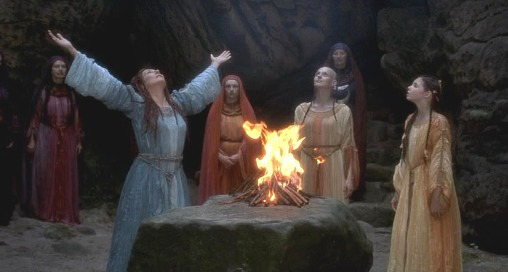
Remember, this novel came out in 1983 – talk about being ahead of your time! If it came out today, the reaction from a certain corner would be something like “it is with a heavy heart that I inform you that tumblr is at it again.”
Man, demographically speaking, that’s called “nailing it.” It used to be one of the favorite books of the kind of person who’s bookshelf is dominated by fantasy novels about outspoken, fiery-tongued redheaded women, who dream of someday moving to Scotland, who love Enya music and Kate Bush, who sell homemade needlepoint stuff on etsy, who consider their religious beliefs neo-pagan or wicca, and who have like 15 cats, three of which are named Isis, Hypatia, and Morrigan.
This type of person is still with us, so why did this novel fade in popularity? There’s actually a single hideous reason: after her death around 2001, facts came out that Marion Zimmer Bradley abused her daughters sexually. Even when she was alive, she was known for defending and enabling a known child abuser, her husband, Walter Breen. To say people see your work differently after something like this is an understatement – especially if your identity is built around being a progressive and feminist author.
Robotech
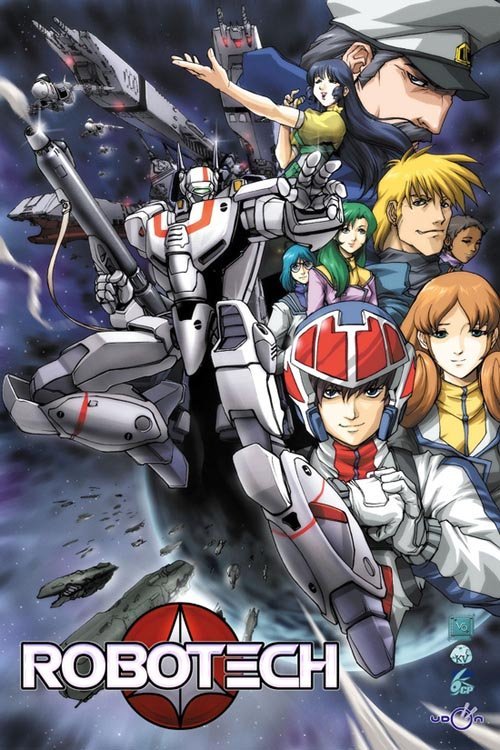
I try to break up my sections on dead fandoms into three parts: first, I explain the property, then explain why it found a devoted audience, and finally, I explain why that fan devotion and community went away. Well, in the case of Robotech, I can do all three with a single sentence: it was the first boy pilot/giant robot Japanimation series that shot for an older, teenage audience to be widely released in the West. Robotech found an audience when it was the only true anime to be widely available, and lost it when became just another import anime show. In the days of Crunchyroll, it’s really hard to explain what made Robotech so special, because it means describing a different world.

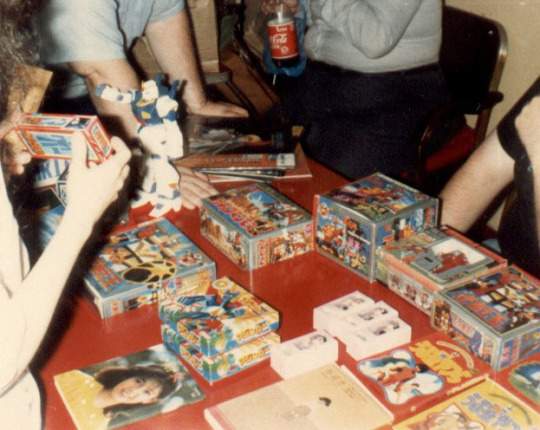
Try to imagine what it was like in 1986 for Japanime fans: there were barely any video imports, and if you wanted a series, you usually had to trade tapes at your local basement club (they were so precious they couldn’t even be sold, only traded). If you were lucky, you were given a script to translate what you were watching. Robotech though, was on every day, usually after school. You want an action figure? Well, you could buy a Robotech Valkyrie or a Minmei figure at your local corner FAO Schwartz.

However, the very strategy that led to it getting syndicated is the very reason it was later vilified by the purists who emerged when anime became a widespread cultural force: strictly speaking, there actually is no show called “Robotech.” Since Japanese shows tend to be short run, say, 50-60 episodes, it fell well under the 80-100 episode mark needed for syndication in the US. The producer of Harmony Gold, Carl Macek, had a solution: he’d cut three unrelated but similar looking series together into one, called “Robotech.” The shows looked very similar, had similar love triangles, used similar tropes, and even had little references to each other, so the fit was natural. It led to Robotech becoming a weekday afternoon staple with a strong fandom who called themselves “Protoculture Addicts.” There were conventions entirely devoted to Robotech. The supposed shower scene where Minmei was bare-breasted was the barely whispered stuff of pervert legend in pre-internet days. And the tie in novels, written with the entirely western/Harmony Gold conception of the series and which continued the story, were actually surprisingly readable.
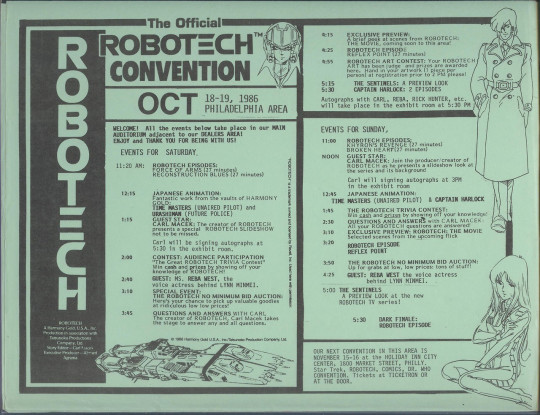
The final nail in the coffin of Robotech fandom was the rise of Sailor Moon, Toonami, Dragonball, and yes, Pokemon (like MC Hammer’s role in popularizing hip hop, Pokemon is often written out of its role in creating an audience for the next wave of cartoon imports out of insecurity). Anime popularity in the West can be defined as not a continuing unbroken chain like scifi book fandom is, but as an unrelated series of waves, like multiple ancient ruins buried on top of each other (Robotech was the vanguard of the third wave, as Anime historians reckon); Robotech’s wave was subsumed by the next, which had different priorities and different “core texts.” Pikachu did what the Zentraedi and Invid couldn’t do: they destroyed the SDF-1.
Legion of Super-Heroes
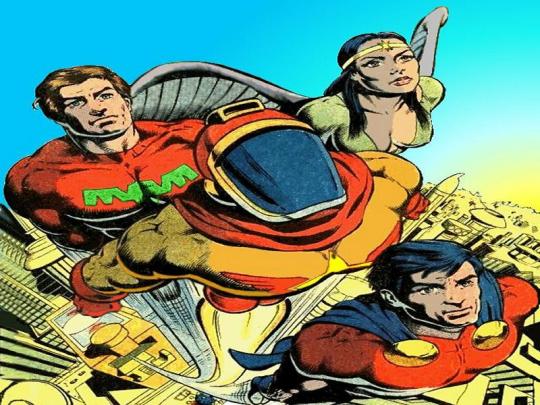
Legion of Superheroes was comic set in the distant future that combined superheroes with space opera, with a visual aesthetic that can best be described as “Star Trek: the Motion Picture, if it was set in a disco.”
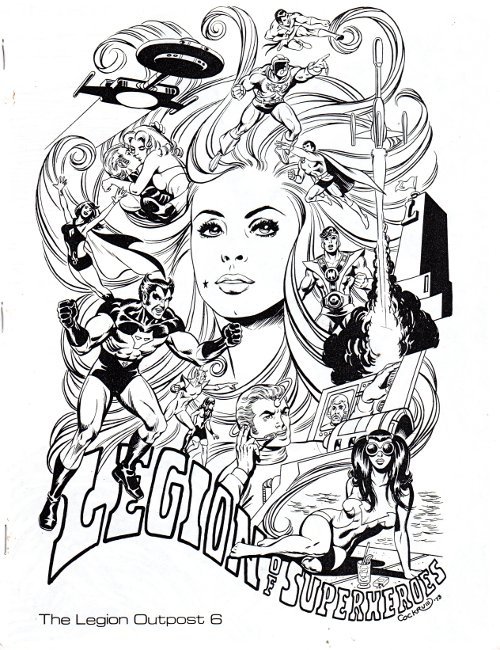
I’ve heard wrestling described as “a soap opera for men.” If that’s the case, then Legion of Super-Heroes was a soap opera for nerds. The book is about attractive 20-somethings who seem to hook up all the time. As a result, it had a large female fanbase, which, I cannot stress enough, is incredibly unusual for this era in comics history. And if you have female fans, you get a lot of shipping and slashfic, and lots of speculation over which of the boy characters in the series is gay. The fanon answer is Element Lad, because he wore magenta-pink and never had a girlfriend. (Can’t argue with bulletproof logic like that.) In other words, it was a 1970s-80s fandom that felt much more “modern” than the more right-brained, bloodless, often anal scifi fandoms that existed around the same time, where letters pages were just nitpicking science errors by model train and elevator enthusiasts.
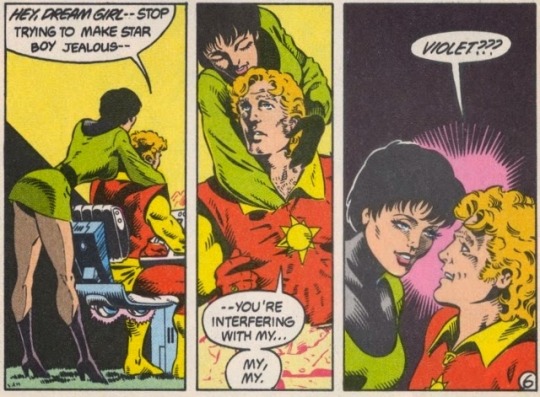
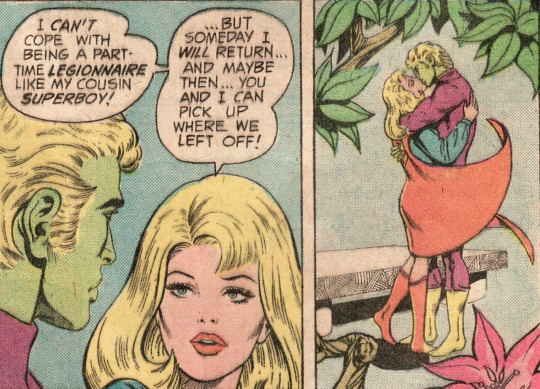
Legion Headquarters seemed to be a rabbit fuck den built around a supercomputer and Danger Room. Cosmic Boy dressed like Tim Curry in Rocky Horror. There’s one member, Duo Damsel, who can turn into two people, a power that, in the words of Legion writer Jim Shooter, was “useful for weird sex...and not much else.”
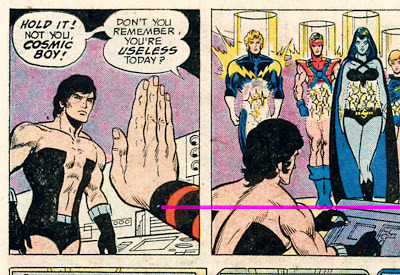
LSH was popular because the fans were insanely horny. This is, beyond the shadow of a doubt, the thirstiest fandom of all time. You might think I’m overselling this, but I really think that’s an under-analyzed part of how some kinds of fiction build a devoted fanbase.
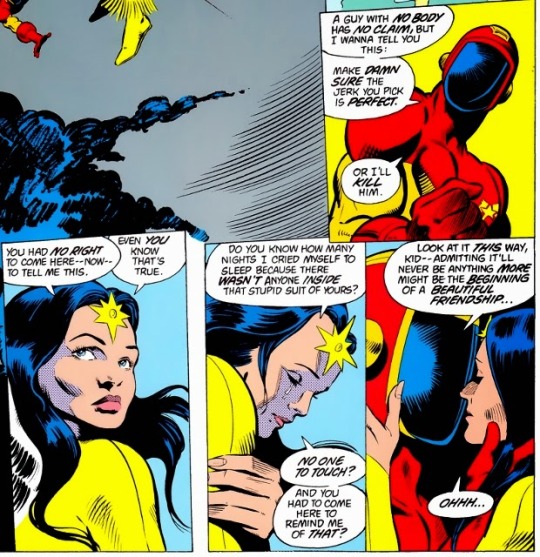
For example, a big reason for the success of Mass Effect is that everyone has a favorite girl or boy, and you have the option to romance them. Likewise, everyone who was a fan of Legion remembers having a crush. Sardonic Ultra Boy for some reason was a favorite among gay male nerds (aka the Robert Conrad Effect). Tall, blonde, amazonian telepath Saturn Girl, maybe the first female team leader in comics history, is for the guys with backbone who prefer Veronica over Betty. Shrinking Violet was a cute Audrey Hepburn type. And don’t forget Shadow Lass, who was a blue skinned alien babe with pointed ears and is heavily implied to have an accent (she was Aayla Secura before Aayla Secura was Aayla Secura). Light Lass was commonly believed to be “coded lesbian” because of a short haircut and her relationships with men didn’t work out. The point is, it’s one thing to read about the adventures of a superteam, and it implies a totally different level of mental and emotional involvement to read the adventures of your imaginary girlfriend/boyfriend.
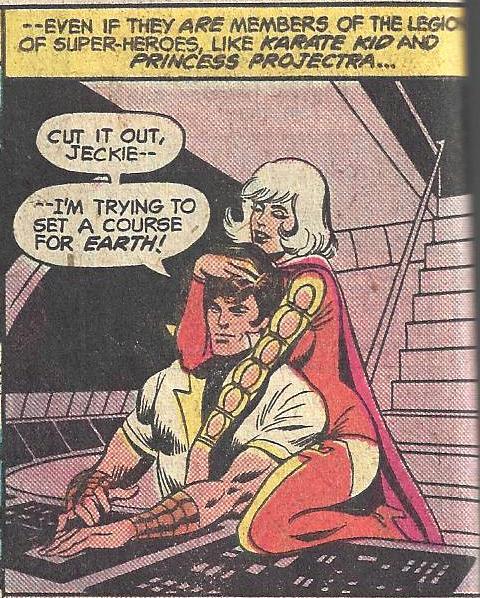
Now, I should point out that of all the fandoms I’ve examined here, LSH was maybe the smallest. Legion was never a top seller, but it was a favorite of the most devoted of fans who kept it alive all through the seventies and eighties with an energy and intensity disproportionate to their actual numbers. My gosh, were LSH fans devoted! Interlac and Legion Outpost were two Legion fanzines that are some of the most famous fanzines in comics history.
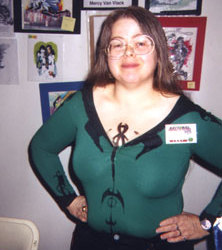
If nerd culture fandoms were drugs, Star Wars would be alcohol, Doctor Who would be weed, but Legion of Super-Heroes would be injecting heroin directly into your eyeballs. Maybe it is because the Legionnaires were nerdy, too: they played Dungeons and Dragons in their off time (an escape, no doubt, from their humdrum, mundane lives as galaxy-rescuing superheroes). There were sometimes call outs to Monty Python. Basically, the whole thing had a feel like the dorkily earnest skits or filk-singing at a con. Legion felt like it’s own fan series, guest starring Patton Oswalt and Felicia Day.
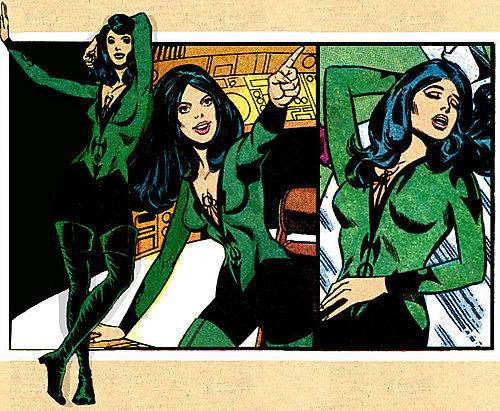
It helped that the boundary between fandom and professional was incredibly porous. For instance, pro-artist Dave Cockrum did covers for Legion fanzines. Former Legion APA members Todd and Mary Biernbaum got a chance to actually write Legion, where, with the gusto of former slashfic writers given the keys to canon, their major contribution was a subplot that explicitly made Element Lad gay. Mike Grell, a professional artist who got paid to work on the series, did vaguely porno-ish fan art. Again, it’s hard to tell where the pros started and the fandom ended; the inmates were running the asylum.
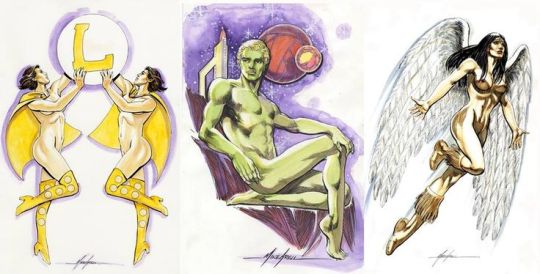
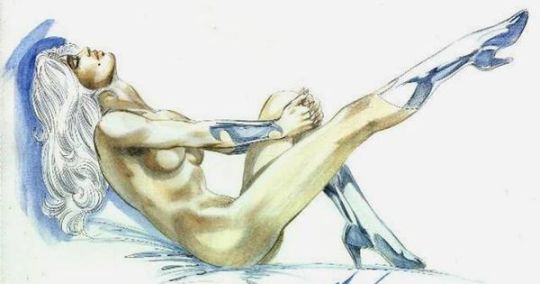
Mostly, Legion earned this devotion because it could reward it in a way no other comic could. Because Legion was not a wide market comic but was bought by a core audience, after a point, there were no self-contained one-and-done Legion stories. In fact, there weren’t even really arcs as we know it, which is why Legion always has problems getting reprinted in trade form. Legion was plotted like a daytime soap opera: there were always five different stories going on in every issue, and a comic involved cutting between them. Sure, like daytime soap operas, there’s never a beginning, just endless middles, so it was totally impossible for a newbie to jump on board...but soap operas know what they are doing: long term storytelling rewards a long term reader.
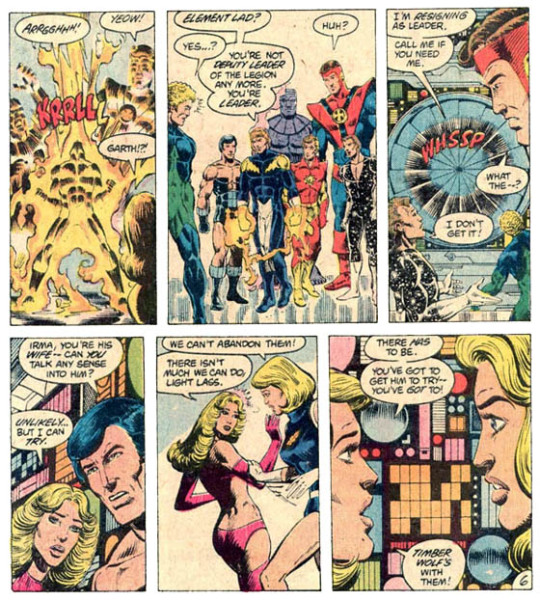
This brings me to today, where Legion is no longer being published by DC. There is no discussion about a movie or TV revival. This is amazing. Comics are a world where the tiniest nerd groups get pandered to: Micronauts, Weirdworld, Seeker 3000, and Rom have had revival series, for pete’s sake. It’s incredible there’s no discussion of a film or TV treatment, either; friggin Cyborg from New Teen Titans is getting a solo movie.
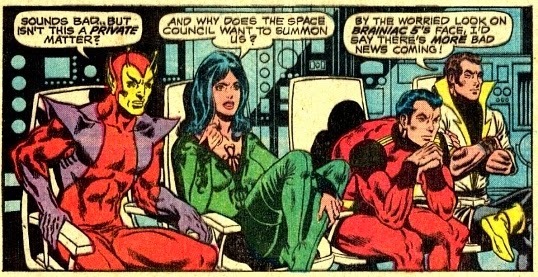
Why did Legion stop being such a big deal? Where did the fandom that supported it dissolve to? One word: X-Men. Legion was incredibly ahead of its time. In the 60s and 70s, there were barely any “fan” comics, since superhero comics were like animation is today: mostly aimed at kids, with a minority of discerning adult/teen fans, and it was success among kids, not fans, that led to something being a top seller (hence, “fan favorites” in the 1970s, as surprising as it is to us today, often did not get a lot of work, like Don MacGregor or Barry Smith). But as newsstands started to push comics out, the fan audience started to get bigger and more important…everyone else started to catch up to the things that made Legion unique: most comics started to have attractive people who paired up into couples and/or love triangles, and featured extremely byzantine long term storytelling. If Legion of Super-Heroes is going to be remembered for anything, it’s for being the smaller scale “John the Baptist” to the phenomenon of X-Men, the ultimate “fan” comic.
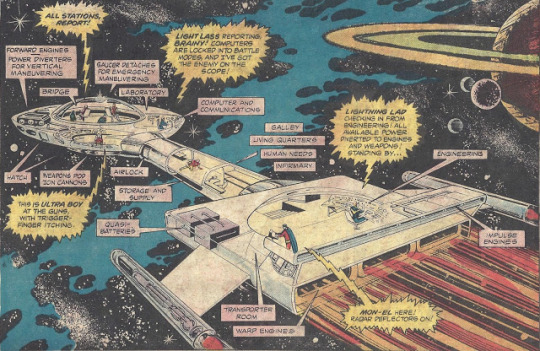
The other thing that killed Legion, apart from Marvel’s Merry Mutants, that is, was the r-word: reboots. A reboot only works for some properties, but not others. You reboot something when you want to find something for a mass audience to respond to, like with Zorro, Batman, or Godzilla.
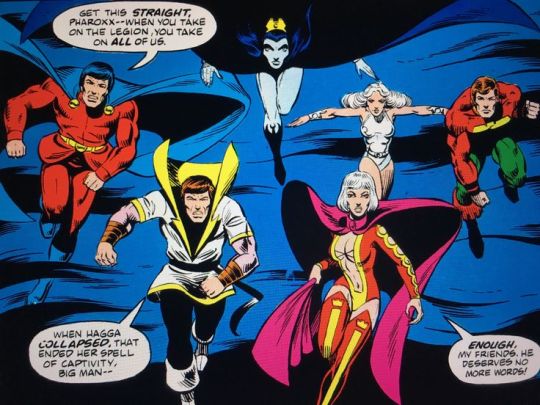
Legion, though, was not a comic for everybody, it was a fanboy/girl comic beloved by a niche who read it for continuing stories and minutiae (and to jack off, and in some cases, jill off). Rebooting a comic like that is a bad idea. You do not reboot something where the main way you engage with the property, the greatest strength, is the accumulated lore and history. Rebooting a property like that means losing the reason people like it, and unless it’s something with a wide audience, you only lose fans and won’t get anything in return for it. So for something like Legion (small fandom obsessed with long form plots and details, but unlike Trek, no name recognition) a reboot is the ultimate Achilles heel that shatters everything, a self-destruct button they kept hitting over and over and over until there was nothing at all left.
E. E. Smith’s Lensman Novels
The Lensman series is like Gil Evans’s jazz: it’s your grandparents’ favorite thing that you’ve never heard of.
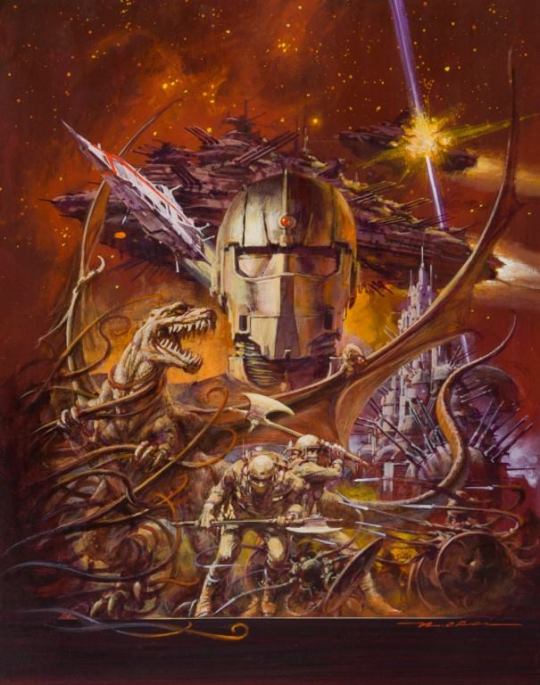
I mean, have you ever wondered exactly what scifi fandom talked about before the rise of the major core texts and cultural objects (Star Trek, Asimov, etc)? Well, it was this. Lensmen was the subject of fanfiction mailed in manilla envelopes during the 30s, 40s, and 50s (some of which are still around). If you’re from Boston, you might recognize that the two biggest and oldest scifi cons there going back to the 1940s, Boskone (Boscon, get it?) and Arisia, are references to the Lensman series. This series not only created space opera as we know it, but contributed two of the biggest visuals in scifi, the interstellar police drawn from different alien species, and space marines in power armor.
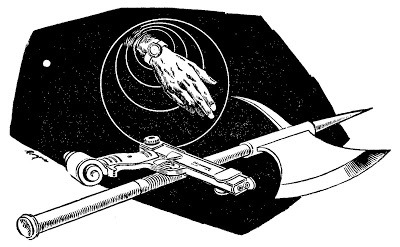
My favorite sign of how big this series was and how fans responded to it, was a great wedding held at Worldcon that duplicated Kimball Kinnison and Clarissa’s wedding on Klovia. This is adorable:
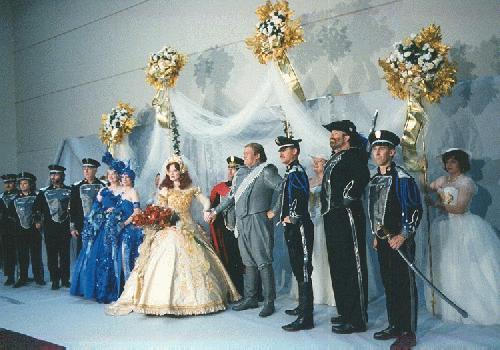
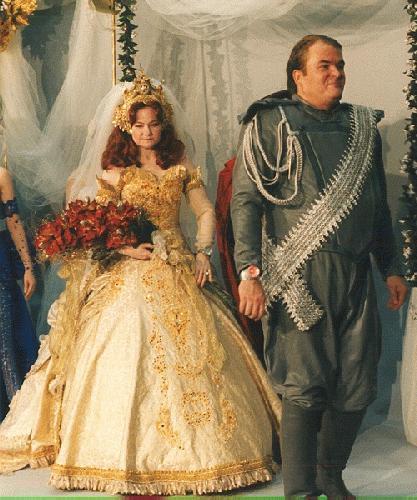
The basic story is pure good vs. evil: galactic civilization faces a crime and piracy wave of unprecedented proportions from technologically advanced pirates (the memory of Prohibition, where criminals had superior firearms and faster cars than the cops, was strong by the mid-1930s). A young officer, Kimball Kinnison (who speaks in a Stan Lee esque style of dialogue known as “mid-century American wiseass”), graduates the academy and is granted a Lens, an object from an ancient mystery civilization, who’s true purpose is unknown.
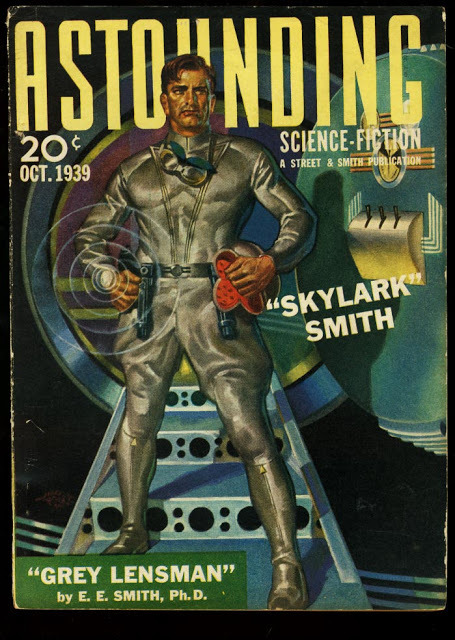
Lensman Kinnison discovers that the “crime wave” is actually a hostile invasion and assault by a totally alien culture that is based on hierarchy, intolerant of failure, and at the highest level, is ruled by horrifying nightmare things that breathe freezing poison gases. Along the way, he picks up allies, like van Buskirk, a variant human space marine from a heavy gravity planet who can do a standing jump of 20 feet in full space armor, Worsel, a telepathic dragon warrior scientist with the technical improvisation skills of MacGyver (who reads like the most sadistically minmaxed munchkinized RPG character of all time), and Nandreck, a psychologist from a Pluto-like planet of selfish cowards.
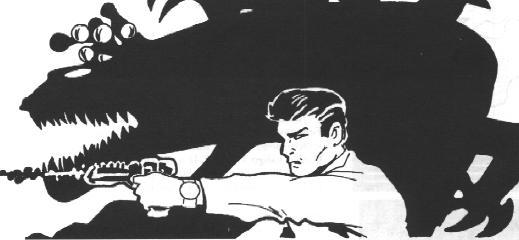
The scale of the conflict starts small, just skirmishes with pirates, but explodes to near apocalyptic dimensions. This series has space battles with millions of starships emerging from hyperspacial tubes to attack the ultragood Arisians, homeworld of the first intelligent race in the cosmos. By the end of the fourth book, there are mind battles where the reflected and parried mental beams leave hundreds of innocent bystanders dead. In the meantime we get evil Black Lensmen, the Hell Hole in Space, and superweapons like the Negasphere and the Sunbeam, where an entire solar system was turned into a vacuum tube.
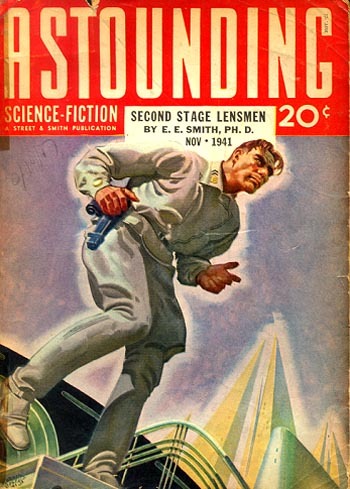
It’s not hard to understand why Lensmen faded in importance. While the alien Lensmen had lively psychologies, Lensman Kimball Kinnison was not an interesting person, and that’s a problem when scifi starts to become more about characterization. The Lensman books, with their love of police and their sexism (it is an explicit plot point that the Lens is incompatible with female minds – in canon there are no female Lensmen) led to it being judged harshly by the New Wave writers of the 1960s, who viewed it all as borderline fascist military-scifi establishment hokum, and the reputation of the series never recovered from the spirit of that decade.
Prisoner of Zenda
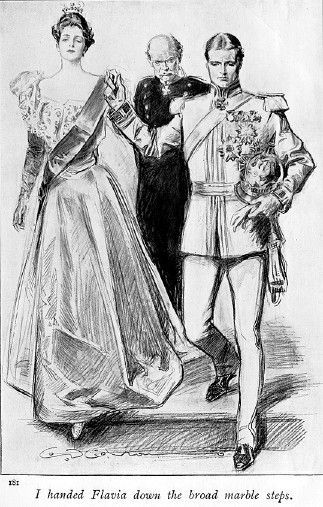
Prisoner of Zenda is a novel about a roguish con-man who visits a postage-stamp, charmingly picturesque Central European kingdom with storybook castles, where he finds he looks just like the local king and is forced to pose as him in palace intrigues. It’s a swashbuckling story about mistaken identity, swordfighting, and intrigue, one part swashbuckler and one part dark political thriller.
The popularity of this book predates organized fandom as we know it, so I wonder if “fandom” is even the right word to use. All the same, it inspired fanatical dedication from readers. There was such a popular hunger for it that an entire library could be filled with nothing but rip-offs of Prisoner of Zenda. If you have a favorite writer who was active between 1900-1950, I guarantee he probably wrote at least one Prisoner of Zenda rip-off (which is nearly always the least-read book in his oeuvre). The only novel in the 20th Century that inspired more imitators was Sherlock Holmes. Robert Heinlein and Edmond “Planet Smasher” Hamilton wrote scifi updates of Prisoner of Zenda. Doctor Who lifted the plot wholesale for the Tom Baker era episode, “Androids of Tara,” Futurama did this exact plot too, and even Marvel Comics has its own copy of Ruritania, Doctor Doom’s Kingdom of Latveria. Even as late as the 1980s, every kids’ cartoon did a “Prisoner of Zenda” episode, one of the stock plots alongside “everyone gets hit by a shrink ray” and the Christmas Carol episode.
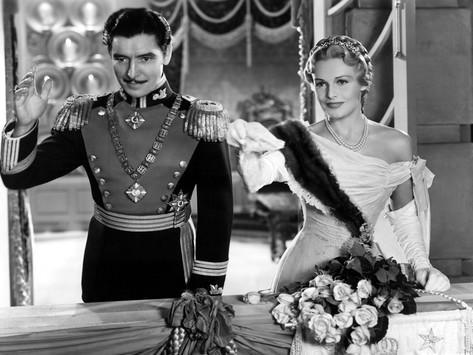
Prisoner of Zenda imitators were so numerous, that they even have their own Library of Congress sub-heading, of “Ruritanian Romance.”
One major reason that Prisoner of Zenda fandom died off is that, between World War I and World War II, there was a brutal lack of sympathy for anything that seemed slightly German, and it seems the incredibly Central European Prisoner of Zenda was a casualty of this. Far and away, the largest immigrant group in the United States through the entire 19th Century were Germans, who were more numerous than Irish or Italians. There were entire cities in the Midwest that were two-thirds German-born or German-descent, who met in Biergartens and German community centers that now no longer exist.
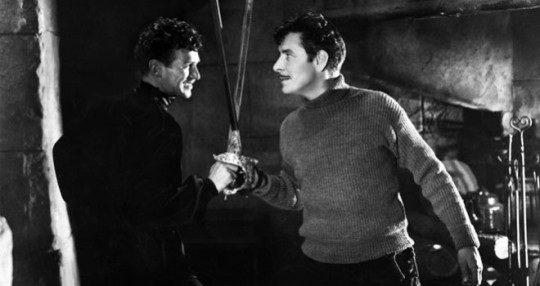
Kurt Vonnegut wrote a lot about how the German-American world he grew up in vanished because of the prejudice of the World Wars, and that disappearance was so extensive that it was retroactive, like someone did a DC comic-style continuity reboot where it all never happened: Germans, despite being the largest immigrant group in US history, are left out of the immigrant story. The “Little Bohemias” and “Little Berlins” that were once everywhere no longer exist. There is no holiday dedicated to people of German ancestry in the US, the way the Irish have St. Patrick’s Day or Italians have Columbus Day (there is Von Steuben’s Day, dedicated to a general who fought with George Washington, but it’s a strictly Midwest thing most people outside the region have never heard of, like Sweetest Day). If you’re reading this and you’re an academic, and you’re not sure what to do your dissertation on, try writing about the German-American immigrant world of the 19th and 20th Centuries, because it’s a criminally under-researched topic.
A. Merritt
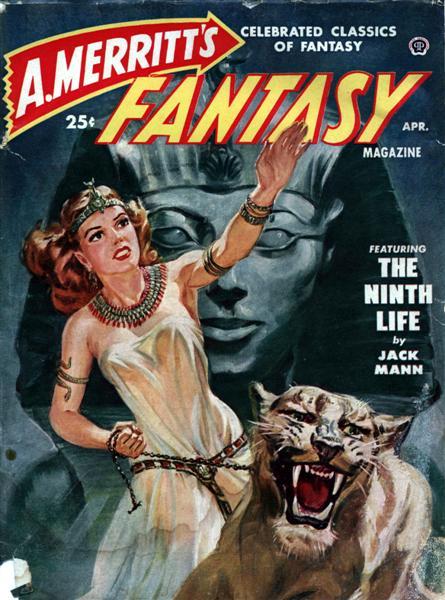
Pop quiz: who was the most popular and influential fantasy author during the 1930s and 40s?
If you answered Tolkien or Robert E. Howard, you’re wrong - it was actually Abraham Merritt. He was the most popular writer of his age of the kind of fiction he did, and he’s since been mostly forgotten. Gary Gygax, creator of Dungeons and Dragons, has said that A. Merritt was his favorite fantasy and horror novelist.
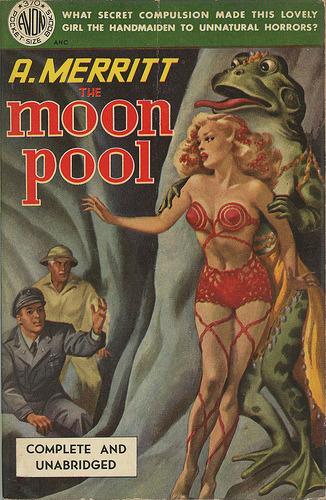
Why did A. Merritt and his fandom go away, when at one point, he was THE fantasy author? Well, obviously one big answer was the 1960s counterculture, which brought different writers like Tolkien and Lovecraft to the forefront (by modern standards Lovecraft isn’t a fantasy author, but he was produced by the same early century genre-fluid effluvium that produced Merritt and the rest). The other answer is that A. Merritt was so totally a product of the weird occult speculation of his age that it’s hard to even imagine him clicking with audiences in other eras. His work is based on fringe weirdness that appealed to early 20th Century spiritualism and made sense at the time: reincarnation, racial memory, an obsession with lost race stories and the stone age, and weirdness like the 1920s belief that the Polar Arctic is the ancestral home of the Caucasian race. In other words, it’s impossible to explain Merritt without a ton of sentences that start with “well, people in the 1920s thought that...” That’s not a good sign when it comes to his universality.
That’s it for now. Do you have any suggestions on a dead fandom, or do you keep one of these “dead” fandoms alive in your heart?
3K notes
·
View notes
Link
“How the [expletive] hell do you review that?” a fellow audience member asked as we made our way out of the New Wimbledon Theatre. Previous productions of Spamalot have been reviewed before, of course, but I found her comment strangely comforting, given the anarchic nature of the evening’s proceedings, in which it became difficult, particularly in the second half, to tell what was scripted, what was improvised humour, and what was simply unintended humour that a closely-knit cast went along with and made the most of.
I do not consider myself a fan of the Monty Python series, and so do not approach this show with rose-tinted glasses. I have seen this show before, however, and my previous encounters with Spamalot have both been in the same venue as this touring production. At the end of May 2010 I attended a production starring Marcus Brigstocke, the comedian and satirist, and Jodie Prenger, who had won a BBC Television series to cast someone to play Nancy in a West End revival of Oliver!. Just over a year later, Phill Jupitus starred as King Arthur.
Here, in 2017, Bob Harms performs the lead role with considerable aplomb, though the powerhouse vocals are the preserve of the Lady of the Lake (Sarah Harlington). She growls a tad too much for my liking, overdoing it, but then Spamalot as a whole is a bit overdone. Take, for instance, ‘I’m All Alone’, a late number in Act Two, where the point about King Arthur having psychological it’s-lonely-at-the-top feelings despite being physically surrounded by the knights of the round table and his trusty assistant Patsy (Rhys Owen) is hammered home until the punchline is in danger of outlasting its welcome.
It is, for the most part, very silly, and as ever, the Python humour doesn’t suit everyone. It works well on stage, fully embracing the concept of theatre as a form of escapism. Yes, I am thinking especially of ‘Always Look On The Bright Side of Life’. The choreography (Ashley Nottingham) suits the silliness brilliantly, with occasional solo flourishes that left the audience audibly gasping – in a good way, I hasten to add. In its elaborate putdowns, the script (Eric Idle) demonstrates imaginative vocabulary. On the other hand, the show feels somewhat smug and, taken at face value, the show’s conclusion as various storylines are resolved in order to serve up a happy and joyful musical theatre ending is not wholly convincing.
But I doth protest too much. If the narrative elements of Monty Python and the Holy Grail are all crammed in to this show – horse riders with no visible horse, the Knights Who Say ‘Ni!’, the ever-defiant Black Knight, and so on – there is some originality in the musical numbers, with much to be enjoyed in the satirical number ‘The Song That Goes Like This’. It’s both a tribute and a parody of the sort of majestic love songs found in Andrew Lloyd Webber musicals that require performers to “overact like hell”.
[See image gallery at http://ift.tt/1FpwFUw]
There are topical references too, which I could attempt to list, but this would, I think, prove too much of a spoiler. Suffice to say that there is a determined effort to include some current affairs in the narrative, in a manner bettered only by seasonal pantos. All things considered, it’s great fun: short and sharp and entertaining.
Review by Chris Omaweng
Funnier than the black death! Lovingly ripped off from the hugely successful 1975 film Monty Python and the Holy Grail, Spamalot is a riotous comedy full of misfit knights, killer rabbits, dancing nuns and ferocious Frenchmen. Join King Arthur as he travels with his hapless Knights of the Round Table on a divine mission to locate the illusive Holy Grail – with uproarious consequences.
Winner of the 2005 Tony Award for Best New Musical the hilarious Spamalot was written by Python legend Eric Idle, with a fantastic score co-written by John DuPrez including Always Look On The Bright Side of Life.
Produced by the award winning Selladoor Productions – producers of Footloose, American Idiot, Avenue Q and Little Shop of Horrors and Mercury Theatre Colchester, this brand new UK tour of Spamalot will have audiences rolling in the aisles.
Spamalot New Wimbledon Theatre Booking to 25th November 2017
http://ift.tt/2hWjuZz London Theatre 1
0 notes